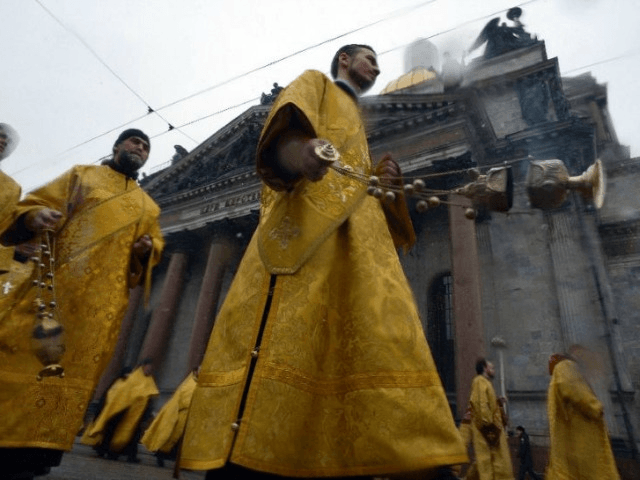Russia continues to mistreat religious minorities, including assaults on religious figures, arrests, and confiscation of religious literature and destruction of property, according to the U.S. State Department’s 2016 International Religious Freedom report.
“The press, NGOs, and religious groups reported government authorities across the country continued to raid the private homes and places of worship of minority religious associations, confiscating and destroying religious literature and other property,” the report’s section on Russia states. “According to Portal-Credo.ru, a website devoted to religion in Russia, the tactic of the police planting prohibited materials at the homes and worship places of minority religious associations had become a widespread phenomenon.”
“Media and NGOs reported the killing of a deputy imam and a number of physical assaults based on religious identity,” the report states. “There were physical assaults on Jehovah’s Witnesses, Pentecostals, Muslims, and Jews, as well as other attacks on individuals, which may have been based on both their ethnicity and religion.”
Although Russia has for a long time targeted Jehovah Witnesses as “religious extremists,” the report said the controversial Yarovaya Package anti-terror law put in place last year is being used to further target this group and other minorities.
“In the first cases under the Yarovaya Package, the government prosecuted individuals of various Protestant denominations, a bishop from the Ukrainian Reformed Orthodox Church, and several ISKON (Hare Krishna) members,” the report states. “According to representatives of religious minorities and NGOs, the Yarovaya legislation’s broad definition of missionary activity meant authorities could prosecute individuals for disseminating religious materials or preaching in addition to proselytizing.”
U.S. citizens have also faced persecution, according to the report.
“The government also fined and deported a number of U.S. citizens it called ‘missionaries,’ in particular volunteers from the Mormon Church,” the report states. “The authorities convicted and fined several individuals for public speech offensive to religious believers.”
The Russian government also targeted Scientology, and does not recognize it as a religious group.
“In June the Supreme Court denied the appeal of the Church of Scientology of Moscow against a decision by a Moscow city court banning the group’s activities in the city on the grounds the group did not qualify as a religious organization according to the law because the term Scientology was a registered trademark in the United States,” the report states. “The use of the registered trademark, according to the court, meant the Church of Scientology of Moscow was acting in the city as a commercial partnership rather than a religious organization.”
“According to media accounts, in June, police raided several Scientology Church facilities in Moscow and St. Petersburg on suspicion of involvement in money laundering,” the report states.
The report also notes the government targeted two bloggers this year for persecution—one for playing a video game in a church.
“In March, atheist blogger Viktor Krasnov was charged with offending the feelings of believers for comments he posted on a website in 2014 describing the Bible as a ‘collection of Jewish fairytales’ and denying the existence of God,” the report states, noting that his case has yet to be taken up by the court at last reporting.
“Gazeta.ru reported a blogger from Yekaterinburg, Ruslan Sokolovsky, had received a two-month prison sentence in September for “inciting enmity and hatred” and “offending the feelings of believers” by playing the game Pokemon Go in an Orthodox church and posting antireligious videos online.”
University of Notre Dame’s Under Caesar’s Sword project issued a report titled “In Response to Persecution” in April, that detailed Russian persecution of Christians.
“Under Vladimir Putin, the relationship between the Russian Orthodox Church and the Russian state is the closest it has been since the Tsarist period. Suffering as a result are non-Orthodox Christians, who make up less than 5 percent of the Russian population and comprise a wide range of Protestants, Catholics, Mormons, and Jehovah’s Witnesses,” the report states.
“Whereas persecution is not as overt as it is in China or Saudi Arabia, national, regional, and local governments in Russia nevertheless strongly curtail religious freedom. The main objective is to curb the growing numbers and vitality of evangelicals and the support from the West that some enjoy,” the report said.
Russia is home to one of the largest Christian populations in the world.
The preface of the State Department reports explains the importance of the congressionally-mandated annual report.
“It has been 19 years since the enactment of the International Religious Freedom Act, landmark legislation that placed the promotion of religious freedom as a central element of America’s foreign policy. The United States promotes religious freedom as a moral imperative,” the preface states. “As importantly, we promote religious freedom because countries that effectively safeguard this human right are more stable, economically vibrant, and peaceful.
“The failure of governments to protect this right breeds instability, terrorism, and violence,” the preface states.

COMMENTS
Please let us know if you're having issues with commenting.